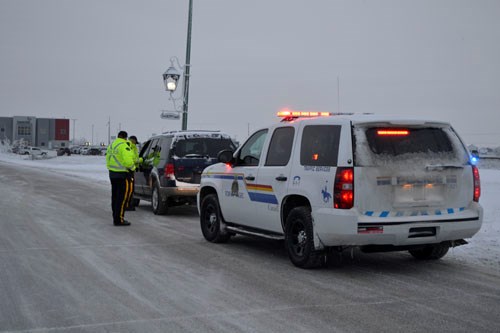Saskatchewan has earned the dubious distinction of having the highest rate of impaired driving in the country, according to Statistics Canada. It's a persistent provincial problem- but Carlyle RCMP Staff Sgt. Darren Simons says drinking and driving is a preventable tragedy- and one which has far-reaching consequences beyond an impaired driver and their victims.
In this province, an average of 60 people are killed and nearly 850 are injured in alcohol-related collisions every year.
“Tragedy happens when you drink and drive,” says Simons, who has over 25 years service with the RCMP. “But the actions of an impaired driver who causes death or injury affect more than those two parties.”
“When there are fatalities and injuries, the adverse effects are obvious,” adds Simons. “But in addition to those directly involved in an accident caused by an impaired driver, the families of the victims and the impaired driver, as well as their friends and members of their communities are all affected. We don't often think of it, but emergency responders as well as the health care system, the legal system and even insurance companies are all affected as well. It goes on and on.”
“But as far as the direct human cost, the friends of those who are involved in an accident where the driver is impaired are sometimes the same people who could have prevented such a tragedy,” he says. “By not confronting the driver and taking their keys or not calling police because they don't want to be accused of being a rat...Well, let's just say I'd rather feel bad about doing something to stop an impaired driver than not doing anything at all- especially when incidents of impaired driving often end in tragedy.”
Simons says that in the new year, the province of Saskatchewan is increasing its enforcement efforts regarding drinking and driving.
“On January 1st, the law changes,” he says. “The change in the law will mean that a 72-hour licence suspension will not only mean that an impaired driver will lose their licence for that period, they'll lose their vehicle, too.”
“Having your vehicle impounded for 72 hours is a hassle- both time and money-wise. The driver will have to pay the towing bill and the storage fee and SGI will increase the cost of their insurance.”
“Those administrative changes to the law and the existing Criminal Code will hopefully help to keep impaired drivers off the roads.”
Simons says that attitudes towards impaired driving have changed since he became a Mountie nearly 26 years ago.
“Twenty-five years ago, there were as many- if not more- impaired drivers on the roads. In rural areas of Saskatchewan, it's still as bad, but that's not because people lack awareness. It's probably because any reduction in impaired driving over time is offset by our increased population.”
Even if awareness has increased, Simons says impaired driving is still a big problem for the province and says that even if laws are toughened- “which they were in Saskatchewan in 2014”- prevention is still the superior strategy when it comes to averting unneccessary tragedy on Saskatchewan roads.
“If you see someone whom you suspect is impaired, take their keys, offer them a ride and call the police, if necessary,” he says. “If you see a suspected impaired driver on the road, pull over safely to the side of the road and call 911 to report them through the Report Impaired Drivers (RID) program.”
“A real misconception people have is how quickly they can become impaired,” says the veteran Mountie. “I instruct the breath-test courses, where RCMP members learn to use the equipment. Even in a controlled environment like that, people think they're okay and they're not.”
“In real life, a lot of people think they're just at the edge. They've had a drink or two and they think they're not impaired, but they could be. It doesn't matter how well you walk. And it's not just a drinking at night thing, either.”
“It's an everyday thing- and often, we find someone who thinks they're not impaired if they get three or four hours sleep before they drive to work. That's not the case. A few hours' sleep does not make someone sober.”
“We all know what we should and shouldn't do,” says Simons. “Always have a designated driver. If you're not sure if your driver is impaired, don't get in their vehicle and make sure they don't get in their vehicle, either. If you're in doubt about your sobriety, don't take the chance.”
“Plan a safe ride home and remember, impairment begins with the first drink. We want everyone to get home safely-during the Christmas season- and all year round.”




